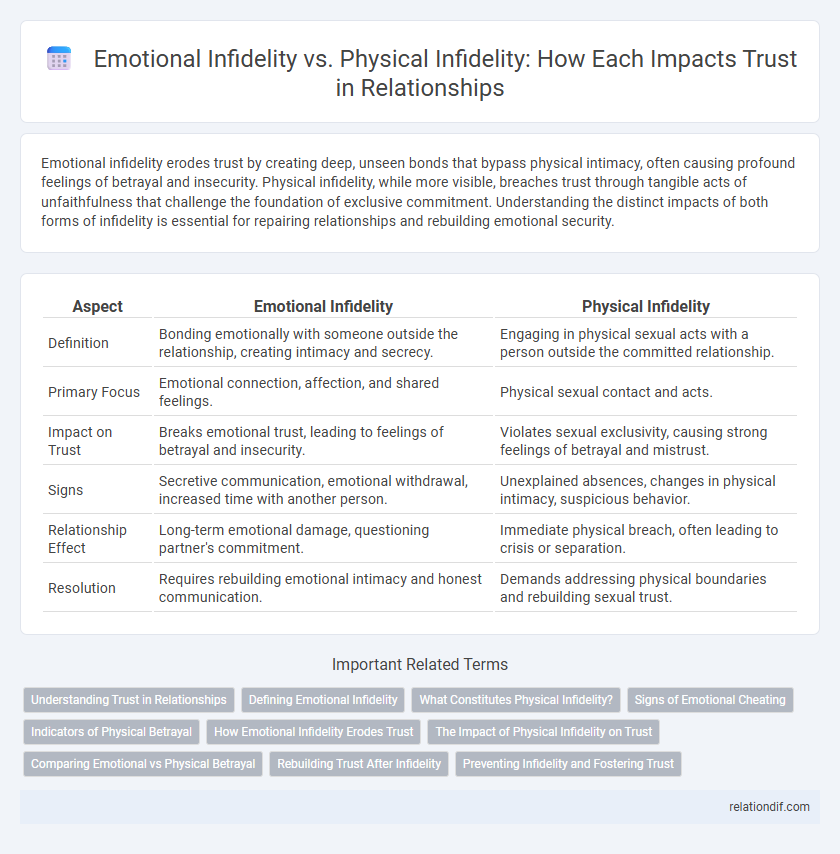Emotional infidelity erodes trust by creating deep, unseen bonds that bypass physical intimacy, often causing profound feelings of betrayal and insecurity. Physical infidelity, while more visible, breaches trust through tangible acts of unfaithfulness that challenge the foundation of exclusive commitment. Understanding the distinct impacts of both forms of infidelity is essential for repairing relationships and rebuilding emotional security.
Table of Comparison
| Aspect | Emotional Infidelity | Physical Infidelity |
|---|---|---|
| Definition | Bonding emotionally with someone outside the relationship, creating intimacy and secrecy. | Engaging in physical sexual acts with a person outside the committed relationship. |
| Primary Focus | Emotional connection, affection, and shared feelings. | Physical sexual contact and acts. |
| Impact on Trust | Breaks emotional trust, leading to feelings of betrayal and insecurity. | Violates sexual exclusivity, causing strong feelings of betrayal and mistrust. |
| Signs | Secretive communication, emotional withdrawal, increased time with another person. | Unexplained absences, changes in physical intimacy, suspicious behavior. |
| Relationship Effect | Long-term emotional damage, questioning partner's commitment. | Immediate physical breach, often leading to crisis or separation. |
| Resolution | Requires rebuilding emotional intimacy and honest communication. | Demands addressing physical boundaries and rebuilding sexual trust. |
Understanding Trust in Relationships
Emotional infidelity undermines trust by creating a deep, often invisible connection that rivals the primary relationship, while physical infidelity breaks trust through direct, tangible betrayal. Both forms of infidelity damage the foundation of trust by fostering jealousy, insecurity, and emotional withdrawal. Rebuilding trust requires transparency, consistent communication, and mutual commitment to address the wounded emotional bond.
Defining Emotional Infidelity
Emotional infidelity involves forming a deep, intimate connection with someone outside the primary relationship, often characterized by secretive communication, emotional dependence, and shared personal experiences. Unlike physical infidelity, it centers on emotional bonds rather than sexual contact, impacting trust and emotional security in a relationship. Recognizing emotional infidelity requires understanding the emotional boundaries and commitments that partners implicitly agree to uphold.
What Constitutes Physical Infidelity?
Physical infidelity involves engaging in intimate or sexual activities with someone outside the primary relationship, violating agreed boundaries and trust. It is characterized by physical contact such as kissing, touching, or sexual intercourse, which results in a breach of exclusivity. Unlike emotional infidelity, physical infidelity is marked by tangible actions that directly undermine relationship fidelity.
Signs of Emotional Cheating
Signs of emotional cheating often include secretive communication, excessive emotional intimacy with someone outside the relationship, and neglecting a partner's emotional needs. Individuals may prioritize conversations or time spent with the third party over their partner, displaying increased defensiveness or reluctance to share details about their interactions. Recognizing these behaviors early can help preserve trust and address underlying relationship issues before they escalate into physical infidelity.
Indicators of Physical Betrayal
Indicators of physical infidelity include unexplained absences, secretive behavior, and sudden changes in appearance or hygiene. Signs such as unfamiliar scents, unfamiliar phone activity, and inconsistencies in stories often point to physical betrayal. Monitoring these behavioral shifts can provide crucial insights into breaches of trust in relationships.
How Emotional Infidelity Erodes Trust
Emotional infidelity erodes trust by creating a hidden bond that bypasses the boundaries of a committed relationship, often leading to feelings of betrayal and insecurity. Unlike physical infidelity, emotional cheating involves sharing intimate thoughts and feelings with someone outside the partnership, which can undermine the emotional foundation and sense of exclusivity. This breach weakens communication and fosters suspicion, ultimately damaging the core trust that supports relationship stability.
The Impact of Physical Infidelity on Trust
Physical infidelity significantly damages trust by violating the foundational expectation of exclusivity in a committed relationship. This breach often leads to intense feelings of betrayal, insecurity, and emotional distress, making it challenging to rebuild confidence between partners. Recovery requires transparent communication, consistent honesty, and a genuine commitment to restoring emotional and physical boundaries.
Comparing Emotional vs Physical Betrayal
Emotional infidelity involves forming deep emotional connections outside the primary relationship, often leading to feelings of neglect and insecurity, while physical infidelity centers on sexual or physical intimacy with someone other than the partner. Emotional betrayal can erode trust by undermining emotional exclusivity, whereas physical betrayal typically breaches boundaries tied to sexual fidelity. Both forms of infidelity damage trust differently, with emotional infidelity impacting emotional security and physical infidelity compromising physical commitment.
Rebuilding Trust After Infidelity
Rebuilding trust after emotional infidelity requires consistent transparency, open communication, and reassurance to address the deeper connection that was compromised. Physical infidelity demands both partners engage in forgiveness and establish clear boundaries to restore physical and emotional safety. Commitment to therapy or counseling facilitates the healing process by helping couples understand underlying issues and rebuild intimacy.
Preventing Infidelity and Fostering Trust
Emotional infidelity, involving deep emotional connections outside the primary relationship, can erode trust just as significantly as physical infidelity. Preventing infidelity requires open communication, setting clear boundaries, and fostering emotional intimacy to reinforce partnership security. Consistently nurturing trust through honesty and mutual respect is essential for maintaining relationship resilience against both emotional and physical betrayals.
Emotional Infidelity vs Physical Infidelity Infographic

 relationdif.com
relationdif.com